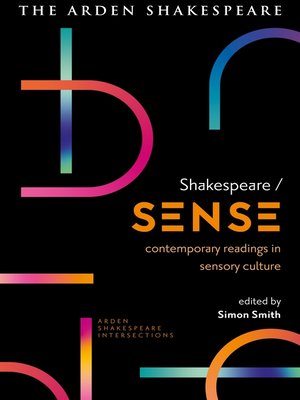Shakespeare / Sense
ebook ∣ Contemporary Readings in Sensory Culture · Arden Shakespeare Intersections
By Simon Smith

Sign up to save your library
With an OverDrive account, you can save your favorite libraries for at-a-glance information about availability. Find out more about OverDrive accounts.
Find this title in Libby, the library reading app by OverDrive.



Search for a digital library with this title
Title found at these libraries:
| Library Name | Distance |
|---|---|
| Loading... |
Shakespeare | Sense explores the intersection of Shakespeare and sensory studies, asking what sensation can tell us about early modern drama and poetry, and, conversely, how Shakespeare explores the senses in his literary craft, his fictional worlds, and his stagecraft.
15 substantial new essays by leading Shakespeareans working in sensory studies and related disciplines interrogate every aspect of Shakespeare and sense, from the place of hearing, smell, sight, touch, and taste in early modern life, literature, and performance culture, through to the significance of sensation in 21st century engagements with Shakespeare on stage, screen and page.
The volume explores and develops current methods for studying Shakespeare and sensation, reflecting upon the opportunities and challenges created by this emergent and influential area of scholarly enquiry. Many chapters develop fresh readings of particular plays and poems, from Hamlet, A Midsummer Night's Dream, King Lear, and The Tempest to less-studied works such as The Comedy of Errors, Venus and Adonis, Troilus and Cressida, and Cymbeline.
15 substantial new essays by leading Shakespeareans working in sensory studies and related disciplines interrogate every aspect of Shakespeare and sense, from the place of hearing, smell, sight, touch, and taste in early modern life, literature, and performance culture, through to the significance of sensation in 21st century engagements with Shakespeare on stage, screen and page.
The volume explores and develops current methods for studying Shakespeare and sensation, reflecting upon the opportunities and challenges created by this emergent and influential area of scholarly enquiry. Many chapters develop fresh readings of particular plays and poems, from Hamlet, A Midsummer Night's Dream, King Lear, and The Tempest to less-studied works such as The Comedy of Errors, Venus and Adonis, Troilus and Cressida, and Cymbeline.







